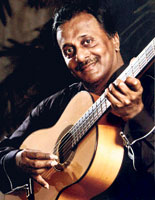a calypsonian (ceylonian )from Sri Lanka? my god what else? the cd has an adventurous life itself,as it was forgotten with a bunch of others ,with 2-3 more from Sri-Lanka among them in a friend's house some years ago
and was repatriated beyond hope last week.as for this music is more close to (a laid back )Madagascar than Trinidad
to my ears...
**************
Music fans will remember him as part of the La Ceylonians singing those lilting calypso tunes with his trademark straw hat and guitar. Many years have passed since those memorable tunes and times but Anura Pathmasiri Jayasingha’s musical journey continued, taking him across the world carrying his brand of music to people.
He has met world renowned singers of the calibre of Harry Belafonte and Lionel Ritchie and his Sinhala songs done with his own group The Balladeers were aired on French radio and television in 1990.
He is philosophical as he looks back: the path to this successful release was not one of roses but he adds that, “It was worth all the trouble I had to go through, because today I am recognized in many countries for my music.”


Anura has presented radio programmes about the beauty of Sri Lanka to a French audience through stations such as the Tropic FM, Radio Asia and Radio France.He is now working on a new instrumental to tell the world that the war has ended in Sri Lanka and that people should visit this land of peace.
Having studied at the Royal Primary and Thurstan College Colombo, Anura with the little music training that he had gained from being a part of the school choir, joined the “La Ceylonians” in 1967. “I would not be here today if it was not for my master Noel Ranasinghe who gave me a place in his band, and Lylie Godridge who trained my voice,” he says with gratitude.
“The Balladeers” was formed shortly after Anura left the “La Ceylonians” in 1986. His close friend Stanley Welgampola named this band and wrote the lyrics for most of his songs. The original members of “The Balladeers” were Rohan Silva who played the mandolin, harmonica, pedal steel, and guitar and also sang together with Nilantha Ariyaratne who played bass guitars and vocals. The late Asoka Ratnapala was among those who played the guitar and did the vocals for the first album of “The Balladeers”-‘Welcome to Sri Lanka’.
‘Welcome to Sri Lanka’ was released in 1990, with 13 original compositions of the Balladeers.
Anura is currently creating a new style in music around the flamenco, the music of the gypsies in Spain and has even got down a flamenco guitar. “I am not a flamenco guitarist and I have never learnt it under a professional but I love this music because I have many friends who play it and I’ve decided to create a new style using Sri Lanka as my inspiration.” !!!!!!
for yummy yummy recipes of Sri Lanka try these 2 links(and tell us what happened):












